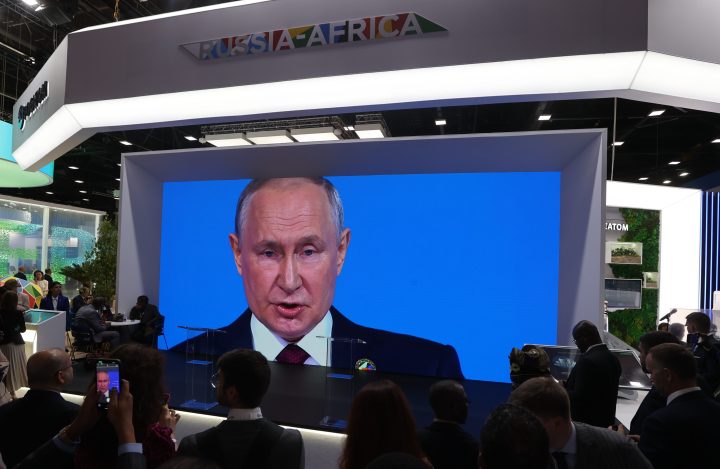ISS TODAY OP-ED
Lacklustre Russia-Africa summit a vanity boost for Putin but a damp squib for the continent

President Vladimir Putin got more out of the Russia-Africa summit than most African leaders.
Russian President Vladimir Putin was hoping for a record turnout of African leaders at the second Russia-Africa summit in St Petersburg last week to show the West he wasn’t isolated after all. He didn’t quite pull that off. Only 16 or 17 African heads of state attended — far fewer than the 43 at the 2019 Sochi summit.
Putin’s invasion of Ukraine evidently deterred many leaders. Moscow claimed ‘brazen interference’ by the West caused them to stay away. Some had other reasons. Kenya’s president William Ruto said Africa’s leaders shouldn’t be “loaded into buses like school children” at foreign summits, and that he felt adequately represented by the African Union (AU). Namibian president Hage Geingob was sick, ISS Today was told. But many others just didn’t feel comfortable showing implicit support for Russia.
So if Putin got some recognition, what did Africa get? Not much, judging by the joint declaration, which looks as though it was written almost exclusively by the Kremlin. It is full of statements implicitly harnessing Africa in support of Moscow’s posture against Western sanctions imposed on it for invading Ukraine.
Certain African leaders nonetheless got some takeaways. Putin announced that over the next six months, Russia would deliver 25,000 to 50,000 tonnes of grain each to the Central African Republic (CAR), Mali, Eritrea, Burkina Faso, Zimbabwe and Somalia — free of charge. It’s no coincidence that these are among Russia’s warmest African friends.
Russia’s private military company Wagner is propping up the CAR and Mali autocracies, with Burkina Faso’s junta possibly next. Mali and Eritrea were the only African countries to vote against United Nations General Assembly resolutions condemning Russia’s invasion of Ukraine.
Putin had a few other items in his goody bags for select countries. He said Russia had cancelled $23-billion of African debt, would open new embassies in Burkina Faso and Equatorial Guinea, and had delivered millions of Covid-19 test kits to Africa. He said Russia had given trade preferences to Africa, but didn’t elaborate.
Although most presidents who attended weren’t very democratic and were already well-disposed to Russia, more mainstream leaders sought something more than handouts or mercenary support.
Quid pro quo insistence
South African President Cyril Ramaphosa, perhaps unexpectedly, given his government’s reputation for Russophilia, spoke for these when he told Putin that Africans hadn’t come for ‘donations’ but wanted him to reinstate the Black Sea Grain Initiative (BSGI). Putin’s withdrawal from the BSGI had led to hiked food prices and food insecurity in Africa. And Ramaphosa said Africa wanted negotiations to end the war in Ukraine.
Neither of these key demands were met. In a closed meeting with Ramaphosa and the six other governments comprising the African peace initiative, Putin apparently insisted he would only reinstate the BSGI when his previously stated conditions concerning lifting Western sanctions were met.
In any event, a subsequent statement by the peace initiative’s leaders showed they took Putin’s side: “The leaders called for specific steps to remove obstacles to Russian grain and fertiliser exports, thus allowing the resumption of the full implementation of the Black Sea package initiative”. Western governments insist Putin’s argument is spurious, as shown by record recent Russian exports of food and fertiliser.
On the peace initiative, the African leaders’ statement merely said the leaders had agreed to continue with it, indicating that Putin hadn’t budged.
Foreign direct investment lacking
Several African leaders at the summit said they wanted Russia to help them overcome Africa’s prevailing trade relationship with the developed world, which involves exporting mostly raw materials and importing mainly manufactured, value-added goods.
Putin insisted that Russia had never thought of Africa as a place to buy raw materials, and had built many enterprises and power and steel plants. But in reality, foreign direct investment in Africa is negligible, and trade is heavily imbalanced in Russia’s favour. Africa still mostly exports raw materials and imports machinery, arms, refined hydrocarbons, fertilisers and chemicals.
Russian exports to Africa were worth seven times the 2020 imports from Africa. Russian trade that year with Africa was about $14-billion — with a surplus for Russia of about $10.8-billion — versus $295-billion overall trade with the European Union, $254-billion with China and $65-billion with the United States.
About 70% of Russia’s African trade is concentrated in four countries — Egypt, Algeria, Morocco and South Africa. At the Sochi summit, Putin promised to double trade in five years; but it has in fact declined.
These statistics partly reflect the absence in Russia of anything like America’s African Growth and Opportunity Act duty-free import scheme or the EU’s Everything But Arms/Economic Partnership Agreements to incentivise their imports of value-added African products. And Russia’s investments in Africa represent about 1% of total inward foreign direct investment.
So it seems the St Petersburg summit was mostly of value to Putin, and those African leaders dependent on Russian military muscle or empathetic to Moscow because of Soviet-era support and a shared sense of victimhood over Western sanctions.
On that score — Yevgeny Prigozhin, the controversial Wagner founder, was reportedly in St Petersburg during the summit. (Since his aborted mutiny in June, he was meant to have been banished to Belarus.) Prigozhin said on video that Wagner fighters who didn’t join the regular Russian army would reinforce Wagner’s presence in Africa.
The day after the summit, Prigozhin blamed Niger’s unfolding military coup on the “former colonisers” who he said were filling the country with terrorists and bandits to keep Africa in check. He appeared to be offering Wagner’s services to the new junta, as Wagner has been fighting violent extremists in neighbouring Mali.
Niger had become the new base for Western military forces helping to fight terrorism, after Mali’s putschist government expelled them. Some wondered whether the Niger coup that toppled the West’s ally Mohamed Bazoum was orchestrated by Russia to further dislodge Western forces. Prigozhin’s apparent presence in St Petersburg conveyed an implicit message from the Kremlin that Wagner’s support in fighting jihadists was also available to other military juntas who expelled the West.
Read more in Daily Maverick: West Africa’s ultimatum to Niger coup leaders nears deadline
Like Putin’s responses to the grain deal and peace negotiations, this is not a solid foundation for Africa to build a normal, prosperous relationship with Russia. DM
Peter Fabricius, Consultant, Institute for Security Studies (ISS) Pretoria.
First published by ISS Today.

















 Become an Insider
Become an Insider
Perhaps it’s my colonialist, white monopoly captured, mentality but why am I left with the distinct impression that there is a world of difference in the ‘power dynamic’ of Africa’s engagement with Russia versus the West?
I am not suggesting for a moment that the West’s motives are altruistic & that strong arming & false diplomacy isn’t part of their toolkit but their isnt even a semblance of respect shown by Putin towards African leaders. We are seen & treated like minor Children.
I have been through enough therapy in my life to recognize victim mentality & behavior & we are never going to be able to claim for ourselves the ideals & objectives of our Constitution until our Govt is able to free their collective minds. Isn’t this essentially what Steve Biko said – free your mind & your ass will follow?
‘Learned helplessness’ is the term I’d use.
You are best judged by the company you keep.